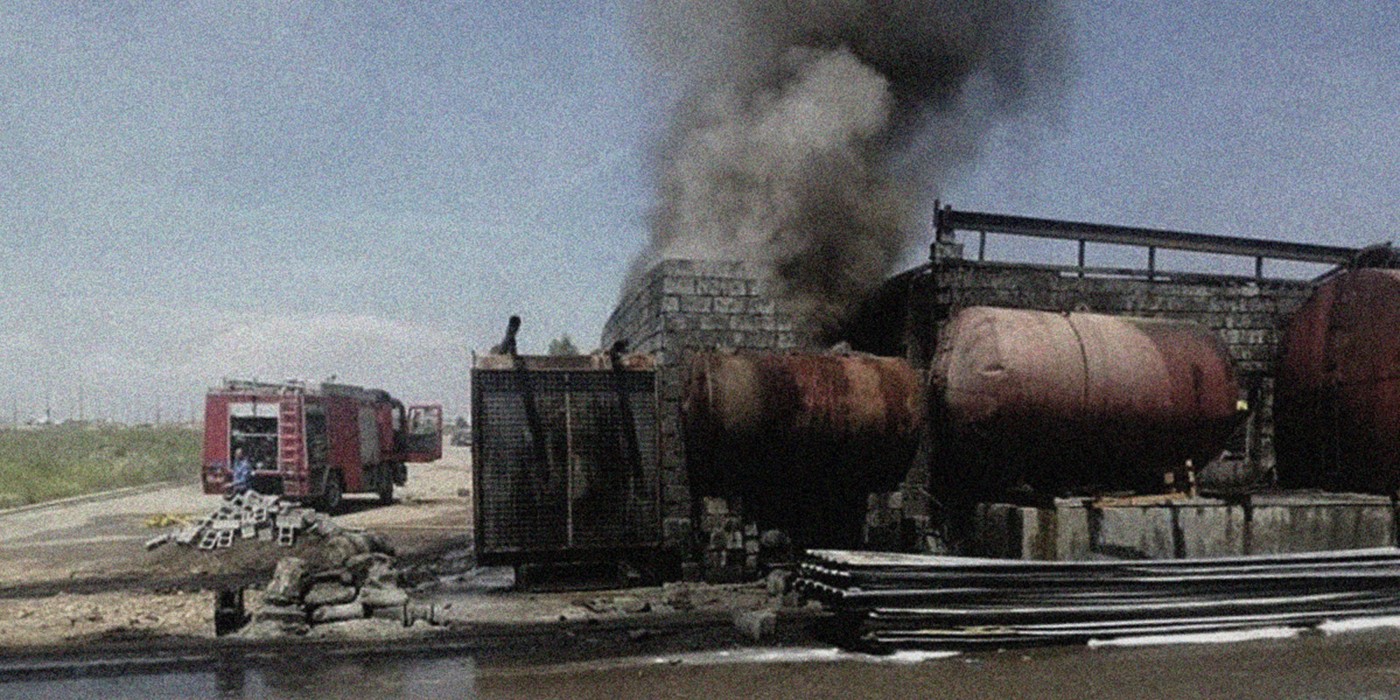Mohammed Hussein, 43, had to evacuate his residence in southern Baghdad after the exterior walls of his house crumbled due to the vibrations induced by nearby generators.
"My plight mirrors that of the majority in the neighborhood grappling with the detrimental impacts of local generators. These machines transgress public decency, sprawling across public spaces with their tangled network of wires dominating every corner, resulting in visual pollution," fists tightly clenched, Hussein vented his frustration with a tone laced with sorrow.
"My family of five members, and I endure persistent allergies and discomfort due to the noxious odors, oily spills, and contaminated water pools discharged by the generators,” he added.
In the midst of stifling emissions and billowing black smoke in the same neighborhood, Karar Abbas, proprietor of a local generator, takes a moment from checking payment lists. His generator disconnects electricity for subscribers who are late in paying their monthly dues.
Expressing the challenges of his job, Karar remarked, "I had no choice but to enter this field due to the limited job opportunities. The work is riddled with continuous problems, especially when there is a sudden malfunction in the generator or dealing with individuals suffering from allergies. Moreover, there are those who can't bear the loud noise of the generator, and I find myself powerless in finding solutions. It is a pervasive issue that the government has been unable to address for decades.”
Iraq grapples with a severe shortage of electrical energy supplies, and the pursuit of alternative methods to secure electricity, apart from power generation stations, has given rise to an environmentally precarious situation across all Iraqi cities.
The country's electricity sector has endured substantial setbacks over the past few decades, stemming from successive wars and the deterioration of infrastructure.
This has resulted in reduced electricity supplies for extended periods, further exacerbated by climate changes and escalating temperatures, particularly during the summer months.
As per an April 2019 report from the International Energy Agency, Iraq boasts an electricity production capacity of around 32,000 megawatts.
However, operational inefficiencies within its transmission network limit the actual generation to only half of that capacity. With a demand of 40,000 megawatts, excluding industrial needs, Iraq finds itself in a challenging position.
Resorting to alternative methods to secure electricity, apart from traditional power generation stations, has given rise to an environmentally precarious situation across all Iraqi cities.
Hence, private diesel generators have emerged as an alternative solution to the electricity predicament, with many of them being manufactured over two decades ago.
Upon activation, these generators release substantial amounts of black smoke (carbon particles) and generate loud, bothersome noises.
Iraqi households collectively allocate an annual budget ranging from 6 to 10 billion dollars, a substantial sum that directly benefits the owners of private generators. This financial outlay is on par with the entire budget of nations solely reliant on electricity expenditures in Iraq.
While private generators play a crucial role in fulfilling the electricity needs of citizens, they are not exempt from environmentally detrimental issues.
Persistent conflicts emerge between generator owners and residents, fueled by the generators' disruptive noises and environmentally harmful emissions.
Additionally, generator owners often manipulate the official pricing, despite it being established by provincial councils. Regrettably, a significant number of generator owners fail to adhere to these pricing regulations.
Meanwhile, Ali Jaber, Director of the Air Quality Monitoring Department at the Ministry of Environment, told The New Region that "the shortfall in the national electricity supply is offset by private generators. Unlike emissions from centralized locations, such as power stations, these emissions are dispersed across broader areas within the city.”
“This has resulted in diverse environmental repercussions, encompassing noise pollution, the discharge of used oils into the sewage system, and the wasteful consumption of potable water for cooling generators during the summer,” he added.
According to Jaber, the solution has led to increasing cancer and respiratory disease.
“Inhaling polluted air poses a threat to human health in the short, medium, and long term. The observed rise in cancer and respiratory-related diseases is a direct consequence of pollution,” he said. “Addressing and mitigating pollutants is a complex challenge that demands resources, concerted efforts, and in-depth studies.”
Water, soil, and air pollution
The Environmental Police in Iraq was established in accordance with Internal Regulation No. 1 of the year 2015. Administratively, it falls under the jurisdiction of the Ministry of Interior, while technically being affiliated with the Ministry of Environment.
The Environmental Police diligently carries out its responsibilities in safeguarding and enhancing the environment through its diverse supervisory and executive agencies, collaborating closely with other governmental entities.
These responsibilities encompass environmental monitoring, with the Environmental Police exercising the legally granted authority of judicial arrest applicable to police officers for environmental offenses. Additionally, they actively receive and investigate complaints and reports related to environmental violations, ensuring appropriate legal actions are taken and diligently following up on the outcomes.
Meanwhile, Firas Salim, the Director of the Environmental Police in Iraq, revealed that the country currently hosts a staggering 49,000 generators.
"The overall number of beneficiaries stands at 6,700,665 subscribers, with the allocated amperes reaching an impressive 25,875,722 amperes within a single month,” he said.
"Beyond air pollution, we've noted fluctuations in pollutant levels attributed to both gasoline and diesel generators. Notably, concentrations of carbon monoxide, nitrogen oxides, and sulfur oxides register higher in gasoline generators compared to their diesel counterparts,” Salim said, adding that “the emissions from diesel generators nearly constitute 10 percent of what gasoline generators emit in terms of carbon monoxide, often exceeding the recommended national thresholds for gasoline-powered generators. While diesel generators do not produce lead compounds, there's a noticeable surge in lead levels, surpassing the suggested national limits when gasoline generators are in use.”
According to Salim, the predominant concern with diesel engines lies in the associated odors and smoke.
“Quantifying the emissions from generators poses a challenge as they tend to disperse in the air, rendering them volatile and hard to measure,” he said. “Nevertheless, specialized devices can gauge pollution in close proximity to the generator, predominantly detecting carbon monoxide, nitrogen oxides, and sulfur oxides."
Noise pollution
Mustafa al-Tayi, the director of the Environmental Police in Karkh, explained that "in response to numerous complaints from a contemporary residential complex in Baghdad regarding the disruptive noise from a generator, committees were assembled to assess the extent of noise pollution using a decibel-measuring device."
He further added that "despite our persistent attempts to measure noise pollution levels, the device ceased to function each time due to the sound surpassing the permissible limit by multiple folds."
Citing information from the World Health Organization, the Centers for Disease Control and Prevention, and the Environmental Protection Agency, it is highlighted that noise pollution stands as a growing health concern.
Noise pollution, denoting undesirable sound in the surroundings, has the potential to subject individuals to hearing impairments, headaches, and stress, consequently impacting overall productivity and quality of life.
"Private generators stand out as significant contributors to noise pollution in Iraq, coupled with odors (chemical pollution) that generate elevated noise levels,” Tayi said. “These generators produce sound waves that propagate through the air, measurable using sound level assessments. The unit for gauging noise is decibels , with noise surpassing 30 decibels being capable of causing psychological disturbances. Levels between 60 to 90 decibels can induce psychological and nervous issues and impair hearing, while noise exceeding 120 decibels directly impacts nerve cells within the ear."
"Our investigation has noted a reduction in sound pressure levels of around 6 to 7 decibels with a doubling of the distance between the source and the listener. Nevertheless, the prevalence of private generators in close proximity to residential areas can result in considerable and noteworthy harm,” he added.
Hussein al-Lami, an expert in psychology and philosophy, links noise pollution to the decline in mental health.
"Noise pollution induces health symptoms not only in humans but also in animals and plants. It results in diminished egg production for chickens and milk for cows,” he said. “Furthermore, it impacts plant growth, the photosynthetic process, and bird migration due to their aversion to loud noises."
Lami added that symptoms of psychological effects include rapid fatigue, nervous exhaustion, feelings of constriction, heightened irritability, frequent complaints, and physiological neural effects.
“This results in an increase in errors, a decline in the ability to concentrate, and impaired mental and cognitive performance,” he said. “At times, noise can result in temporary or permanent hearing loss. Specific studies suggest that noise influences an individual's cognitive ability, causing mental stress and an inability to comprehend and learn."
Human rights
Raghad Wadood al-Rifai, an environmental security specialist at the High Commission for Human Rights, highlighted the concerning impact of private generators on human rights.
"Given the significant shortage of electricity in the country, many citizens rely on private generators to compensate for the deficiency," she explained. "However, this reliance gives rise to a host of human and environmental issues. Our teams, working in Baghdad and the provinces, have identified several problems, including adverse effects on health and psychological well-being."
Rifai elaborated on the issue, stating that "the lack of soundproofing in most generators leads to noise pollution, while the improper disposal of waste in the sewage network poses additional environmental hazards."
She emphasized that the indiscriminate placement of these generators, without adherence to spatial standards, exacerbates their negative impact, outweighing any benefits they may provide.
Rifai further emphasized that "the presence of these generators, totaling 49,000 in the private sector, necessitates compliance with national environmental regulations, including Law No. (27) of 2009 for the protection and enhancement of the environment."
Furthermore, adherence to the environmental standards outlined by the World Health Organization for sound levels is crucial to mitigate noise-related health risks in residential areas, where levels should ideally range between 50 and 55 decibels.
Exceeding these limits can result in auditory impairments such as permanent and temporary hearing loss, as well as physical harm.
Additionally, she highlighted the psychological impact, respiratory issues, and allergies associated with generator emissions, along with the adverse effects on the local environment.
Such practices are not in line with global efforts to combat the climate change crisis and promote a transition to clean and renewable energy sources.
"The Commission, in accordance with Law No. (53) of 2008, receives numerous complaints from individuals, groups, and civil society organizations concerning human rights violations arising from harmful emissions and noise pollution. It's imperative that citizens have the right to reside in a safe and healthy environment”, Rifai said. ”Furthermore, the Commission accepts complaints from citizens in Baghdad and the provinces, advocating for the enforcement of their rights in alignment with the prevailing national laws and the relevant institutional authorities tasked with upholding these rights."
Water footprint
The water footprint represents a multifaceted mathematical calculation utilized to gauge the quantity and proportion of water usage, particularly pertinent amid the prevalent scarcity of water resources across numerous countries globally.
Positioned within the realms of both carbon and environmental footprints, it provides insight into water consumption patterns. In the Middle East, the average water footprint stands at 8,600 liters per day, considerably higher than the global average of 3,794 liters per day.
Alarmingly, around 2 billion individuals worldwide lack access to safe drinking water, with nearly half of the global population grappling with acute water scarcity at some point during the year.
In the backdrop of the ongoing global water crisis, the considerable utilization and squandering of fresh water by private generators present notable hazards to both the environment and society.
This is particularly concerning given the backdrop of climate change and population expansion, intensifying the impact.
Such practices jeopardize the availability and purity of fresh water resources. Iraq's water scarcity crisis has deepened in recent years, exacerbated by a combination of factors such as inadequate water management, the effects of climate change, and diminished water supplies from upstream nations. These interlinked challenges underscore a pressing issue that demands urgent attention and resolution.
A report from the United Nations Information Center has uncovered that approximately 13,920 families across 10 provinces in Iraq have been compelled to evacuate their homes due to drought.
Highlighting the severity of the situation, the United Nations Environment Programme ranks Iraq fifth among the countries most severely impacted by climate change and drought globally.
On a governmental level, Minister of Water Resources Aoun Dhiab has grimly stated that "water levels in Iraq have plummeted to unprecedented lows."
Moreover, according to the United Nations, the area of Iraq's southern marshes, sustained by the floodwaters of the Tigris and Euphrates rivers, has dramatically shrunk from 20,000 square kilometers in the early 1990s to a mere 4,000 square kilometers based on the latest estimations.
Following a statistical analysis of 15 generators from different areas in Baghdad, the report's author calculated the water footprint of private generators in Iraq and the volume of water squandered for their cooling as outlined below:
Each generator, particularly during the summer season, utilizes a minimum of approximately 2,000 liters or 2 cubic meters of water per day. With a total of 49,000 private generators operating in Iraq, this collective consumption amounts to a staggering 98,000,000 liters daily, equivalent to 98,000 cubic meters.
Over the course of a month, these generators collectively consume a staggering 2,940,000,000 liters, or 2,940,000 cubic meters of water. To put this into perspective, this quantity could amass to form a sizable lake!
Despite the allocation of billions of dollars to the electricity sector, private generators continue to dominate the energy landscape, posing significant environmental challenges.
The Iraqi government has struggled to address the electricity crisis, particularly during the sweltering summer months when temperatures soar beyond half the boiling point. The electricity dilemma persists as a complex issue, shaped by years of accumulated challenges and the burdens inherited from previous administrations.





 Telegram
Telegram



